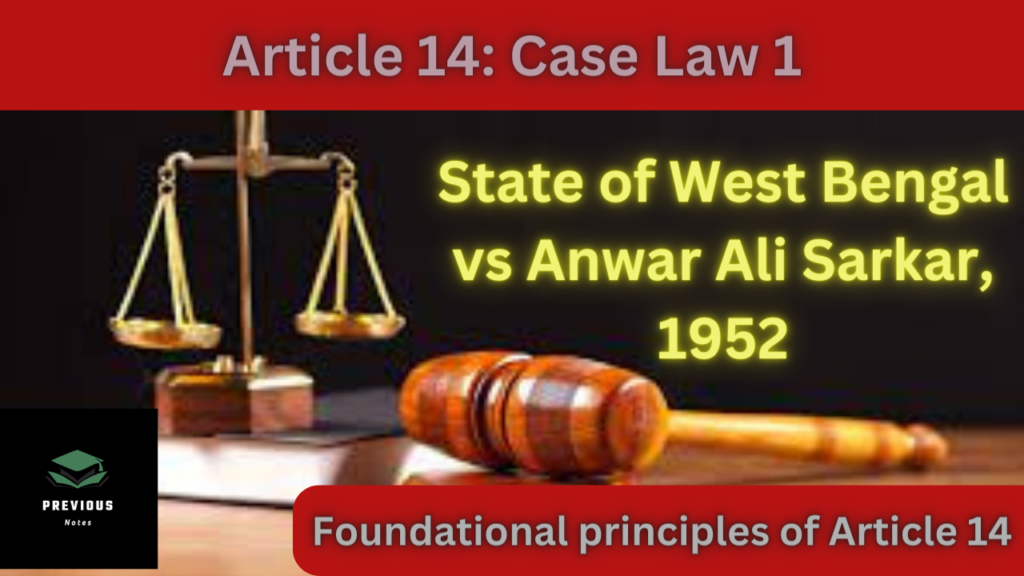Article 14 of Indian Constitution

“The State shall not deny to any person equality before the law or the equal protection of the laws within the territory of India.”
Article 14 is a fundamental right enshrined in the Indian Constitution, which guarantees equality before the law and the equal protection of laws to all persons within the territory of India. This means that the State cannot discriminate against any person on the grounds of religion, race, caste, sex, or place of birth. It ensures that every person, irrespective of their background, is treated equally under the law. Article 14 is a cornerstone of the Indian Constitution’s commitment to justice, liberty, and equality.
While the terms “equality before the law” and “equal protection of the laws” are related concepts, they have distinct meanings and implications:
Equality Before the Law:
- This principle emphasizes that every individual, regardless of their social or economic status, is subject to the same laws.
- It implies that no one is above the law, and everyone is equal in the eyes of the law.
- All individuals, irrespective of their background, are to be treated equally by the legal system.
Equal Protection of the Laws:
- This principle goes beyond mere formal equality before the law. It ensures that individuals in similar circumstances are treated alike.
- It implies that the law should provide equal protection and benefits to all individuals who are in similar situations or circumstances.
- While equality before the law ensures equal subjection to legal procedures, equal protection of the laws aims to prevent arbitrary or discriminatory application of laws.
In summary, equality before the law emphasizes equal treatment by the legal system, while equal protection of the laws extends this principle to ensure that individuals facing similar circumstances are treated equally and without discrimination. Both concepts work together to uphold the broader principle of justice and fairness within a legal framework.
Fact of the Case:
- West Bengal Special Courts Act, 1950 was passed by West Bengal Govt.
- Speedy trial for there for certain offences in this Act.
- Section 3 of the Act empowered the State Government to constitute special Courts
- Section 5 of this Act, whose constitutionality was impugned allowed these Special Courts to try such offences according to the directions of the State Government.
Question?
Whether State Govt. Can pass such order?
Court:
- Supreme Court invalidated the Act
- Court held it as arbitrary powers used by the state.
- The Act did not lay down any policy/guideline for classification of such offences
- The necessity of a speedy trial was too vague and uncertain a criterion to form the basis of a valid and reasonable classification.
- Court said “Article 14 does not insist that every piece of legislation must have universal application and it does not take away from the State the power to classify persons”.
- Court formed rule for classifactions:(i) the classification must be founded on an intelligible differentia which distinguished those that are grouped together from others. (ii) that differentia must have a rational relation to the object sought to be achieved by the Act. The differentia which is the basis of the classification and the object of the Act are distinct things and what is necessary is that there must be a nexus between them.
Fact of the Case:
- The mills of the company were shut down due to mismanagement on the part of the company.
- The Central Government enacted a Central Act to regulate the functioning of the Company.
- This act was questioned by the shareholder.
- The shareholder filed a petition on the validity of the ordinance as it violated the fundamental rights of both shareholder and the company.
Issues Invovled:
- Whether the petition is maintainable?
- Whether the impugned legislation amounts to acquisition or taking possession of private property within the meaning of the Article 31 of the Constitution of India?
- Whether the Act is in contravention with Article 14, 19(1)(f) and 31 of Constitution of India?
Court:
- Presumption is always in the favour of the Constitutionailty of the enactment.
- Presumption may be refuted by showing that there is no proper or reasonable classification.
- Principle of equality does not mean law must have universal application.
- Principle of equality gives the state the power to classify person for legitimate purpose.
Fact:
- Petitioner-IAS, In Nov. 1969-post of Chief Secretary appointed.
- Was Later transferred.
- appointed for post of Deputy Chairman Planning Commission (temp. Created for one year initially).
- Was on leave, not joined office.
- Later junior appointed as chief sec. post.
Question:
- First, the petitioner is appointed to a post or transferred to a post which is not validly created within the meaning of Rule 4 of the Indian Administrative Service (Cadre) Rules,. 1954.
- Second, under rule 9 of the Indian Administrative Service (Pay) Rules, 1954 no member of the Service shall be appointed to a post other than a post specified in Schedule III unless the State Government concerned in respect of posts under its control or the Central Government in respect of posts under its control, as the case may be, make a declaration that the said Post is equivalent in status and responsibility to a post specified in the said Schedule. It is, therefore, said that the Petitioner who is a cadre post holder, viz., holding the post of Chief Secretary cannot be posted to a non-seheduled Post without a declaration that the nonscheduled post is equal in status and responsibilities to a scheduled post.
- Third, the petitioner is posted to an office which is inferior in status and office to that of the Chief Secretary. Therefore, the order is a hostile discrimination offending Articles 14 and 16.
- Fourth, the creation of the post as well as the; appointment and transfer of the petitioner to the post is malafide.
Judgement:
- The bench had rejected the petition unanimously.
- was arbitrary and violative of Arts. 14 and 16, though it may seem plausible, cannot be accepted.
- The burden of establishing mala fides is very heavy on the person who alleges it.
Why it is so Important.
- Equality is antithetic to arbitrariness.
- New Concept: Justice Bhagwati Ji: Natural Justice. (Rule of Law).
- Equality and arbitrariness are sworn enemies.
- Where an act is arbitrary it is violative of Article 14.
- Art. 14: ensure fairness and equality in treatment and strikes at arbitrariness in state action.
Fact of the case:
- Regulations 46 and 47 of the Air India Employees Service Regulations was challenged.
- It was challenged on the ground of discrimination based on sex.
- stating it to be ultra vires of Articles 14,15,16 and 21 of the Indian Constitution.
- Regulation 46 Air India Employees Service Regulations states:
Retiring Age:
Subject to the provisions of sub-regulation (ii) hereof an employee shall retire from the service of the Corporation upon attaining the age of 58 years, except in the following cases when he/she shall retire earlier:
(c) An Air Hostess, upon attaining the age of 35 years or on marriage if it takes place within four years of service or on first pregnancy, whichever occurs earlier.
Regulation 47 Of Air India Employees Service Regulations states:
Extension of Service.
Notwithstanding anything contained in Regulation 46, the services of any employee, may, at the option of the Managing Director but on the employee being found medically fit, be extended by one year at a time beyond the age of retirement for an aggregate period not exceeding two years, except in the case of Air Hostesses and Receptionists where the period will be ten years and five years respectively.”
Question:
- Regulation 46 & 47 are violative of Articles 14,15, 16 of the Constitution of India.
- Arbitrary power under section 47.
Court:
- The bench had rejected the petition unanimously.
- article 14 only forbids against hostile discrimination and not against reasonable classification.
- these regulations are on an arbitrary and unreasonable basis (by making a classification on the basis of sex) .
- clauses regarding retirement and pregnancy as unconstitutional & similar way Regulation 47.
- Birth of third child instead of pregnancy.


















Leave a Reply